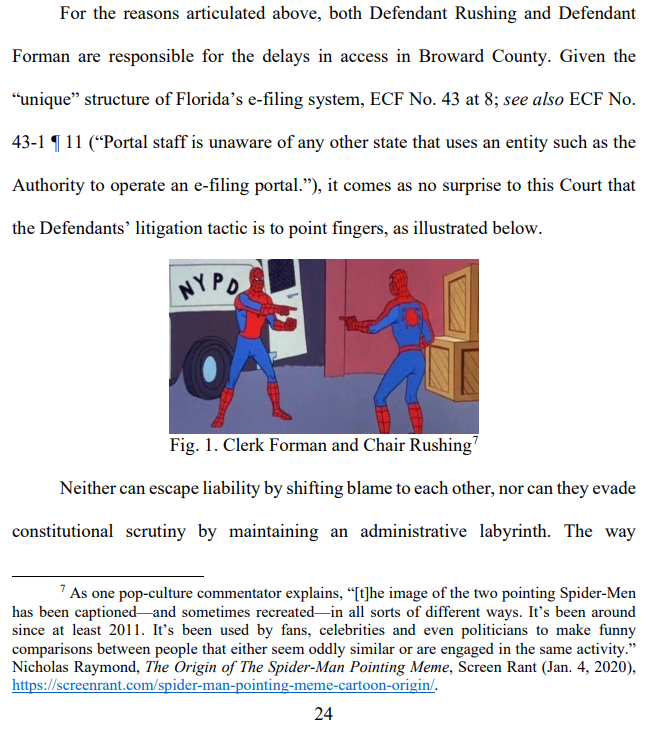There are always going to be a fair share of weird things going on in federal court, often because people come up with some odd ideas for lawsuits. It’s rare, though, that the strangeness is coming from a judge, but here we go. If you jump down to page 24 of an injunction in Courthouse News Serv v. Forman, you’ll see Judge Mark Walker using the Spider-Man Pointing meme to describe two defendants who are asserting the blame rests with the other.
A screenshot taken from the injunction PDF
You’ve got to give the judge some points for creativity and originality, but even the explanatory footnote feels like a half-hearted justification. It’s quite likely, if not probable, that we’re just looking at a little PR stunt. Just a marketing gimmick by the judge to draw attention to the governmental systems in place that leads officials to shift blame rather than accept responsibility.
And you know what? It worked!
It’s an interesting court case and one of particular interest to Extract as hundreds of counties across the country are using our ID Shield automated redaction software to improve and automate one of the factors central to the case, PII redaction. The result of the injunction is that the Broward County Clerk of Court and the Florida Courts’ e-Filing system are going to have to speed up access to court records while still protecting litigants’ and defendants’ privacy rights.
The problem lies in the process. In Florida, those filing documents with the court are responsible for not only redacting any sensitive information within their filing, but also flagging the document as containing sensitive information. But all of that information like whether or not a document contains confidential information, the remedies sought, and claim amounts doesn’t get shared from the filing system to the counties. The filings are turned around in about five minutes and the county is left to separate the confidential and non-confidential files.
Broward County’s manual process for ensuring that documents with personally identifiable information is the slowest in the state, but at the same time, their process could be significantly more efficient if the state was better at sharing. Hence the finger pointing.
While the judge has made an accurate assessment of the two defendants’ strategy for defense, it’s clear that each of them have a point. There’s no sense in touting a five-minute turnaround time for documents when the way they’re being delivered is causing delays further into the workflow, particularly when the data exists to make things run more smoothly. On the county side, we do know that things are a bit trickier in Florida given the filer’s redaction responsibility, but at the same time, there are solutions available to automate the redaction process with software like ID Shield.
ID Shield redaction software turns documents into computer-readable text, then reads them like a person would, identifying clues within a document that point to personal information along with the sensitive information itself. Rather than relying on someone else in the workflow like the filer or state to identify whether a document contains data that needs to be redacted, you can know it yourself, instantly.
If you’d like to see a demonstration of our software, or just have a discussion about how we might be able to help, please send us an email or give us a call and we’d be happy to help.
About the Author: Chris Mack
Chris is a Marketing Manager at Extract with experience in product development, data analysis, and both traditional and digital marketing. Chris received his bachelor’s degree in English from Bucknell University and has an MBA from the University of Notre Dame. A passionate marketer, Chris strives to make complex ideas more accessible to those around him in a compelling way.


